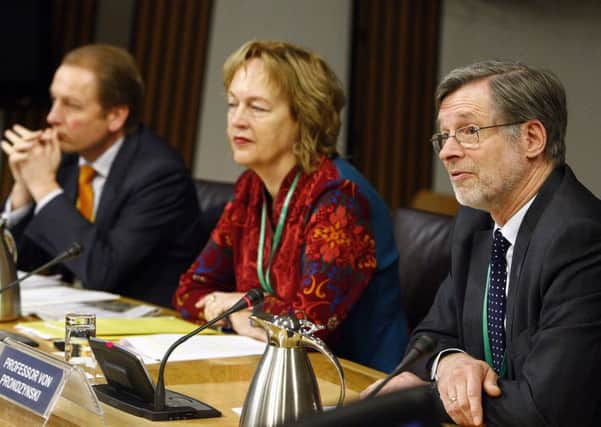Independence debate ‘is not scaring off talent’


The referendum has given Scotland a greater international profile with more researchers now saying “I wish I worked in Scotland”, Holyrood’s Education Committee heard.
Scotland is seen as being “more sympathetic to the value of education”, Queen Margaret University principal Petra Wend said.
Advertisement
Hide AdAdvertisement
Hide AdRobert Gordon University principal Ferdinand von Prondzynski said the Scottish Government would want research funding that is “equal to or better” than the current UK offering.
Unionist claims that independence creates “uncertainty” were dismissed with a quote from Stalin.
The Westminster Conservatives’ promised in/out referendum on the European Union was said to be causing more concern.
Professor Paul Boyle, representing Research Councils UK (RCUK), said Scotland benefits from being part of the UK research councils, but acknowledged that three-quarters of funding comes from non-government sources.
Conservative education spokeswoman Mary Scanlon insisted the outcome of research funding negotiations in the event of independence is “not predictable”.
Prof von Prondzynski said: “I think it was Stalin who said at a convention of historians in Moscow in 1948: ‘The future is clear, it is the past that is uncertain’.
“I don’t hold that view. No future is ever clear. I think we always have uncertainties as to what we are facing in the future.
“Clearly no negotiations are predictable in advance of them taking place.
Advertisement
Hide AdAdvertisement
Hide Ad“There is no certainty even if there were no constitutional change that Scotland would always draw 12% to 14% of UK Research Council funding.”
He added: “We would expect that it would be the Scottish Government’s objective to ensure that, however all of this plays out, that there is a significant fund of research available for Scotland equal to or better than what is available now.”
Prof Wend said: “There have been anecdotes in the papers that Scotland does not attract talent any more from other countries because researchers are worried about the future in terms of the EU and research funding and so on. That does not seem to be the case.
“I’ve asked around other universities as well and, including my own university, we have attracted really excellent researchers from Ireland and England who made the positive choice to come to Scotland.
“I’ve seen an influx of researchers coming to Scotland, and anecdotally when I speak to English researchers increasingly I hear: ‘I wish I worked in Scotland’.
“They feel that the Scottish landscape in terms of higher education is more sympathetic to the value of education to a country.”
Prof von Prondzynski said Scottish higher education is “seen as a fairly stable setting”.
“I would agree that there is no evidence, whatever one’s view of the referendum might be, that this has had a negative impact on our capacity to employ globally.
Advertisement
Hide AdAdvertisement
Hide Ad“Not just from rUK, because I have certainly noticed no change in recent job application patterns, nor outside of the UK or indeed Europe.
“One possible analysis one could make is that the increasingly global discussions about Scotland’s future has created a profile for Scotland, and has made people aware of it which might in some respects actually help.”
Prof Wend said the Tory EU referendum is “a concern”, while Prof von Prondzynski said it would be “a nightmare scenario” if an independent Scotland stayed in the EU and the remainder of the UK left.
Professor Boyle said: “Scotland benefits from being part of RCUK and I think the view in rUK is that we both benefit from having a strong UK research system. In combination we can do so much more.
“Having large funding organisations allow you to invest in big science, which would be more challenging if there was a separate smaller funding organisation.”
He said it is “absolutely true” that Scotland has a mixed economy for research funding, but 92% of funding in Europe comes from national funding organisations.
But he acknowledged only 26% comes from research councils, leaving 74% made up from a variety of other sources including charities and foundations.
The UK Government’s Scotland Analysis paper on science and research states: “In the event of a vote in favour of independence, new regulations and institutions would create uncertainties for researchers and investors.
Advertisement
Hide AdAdvertisement
Hide Ad“Key factors for attracting leading academics can be more readily provided as part of the larger UK research base and funded by the large and diverse tax base.”
SEE ALSO